 设为首页
设为首页
 加入收藏
加入收藏
Beethoven(贝多芬)
Beethoven was one of the greatest composers(作曲家) in the world. He was born in 1770 and died in 1827.
Even as a child Beethoven did not have a happy life. His father was a singer. But he was lazy(懒惰的)and always drank a lot. When the boy was only four, his father decided(决定)to make him a musician(音乐家). So Beethoven had to play hour after hour on different musical instruments(乐器). He learned so fast that he was able to go around and give concerts when he was only 11. When he was 17, he won high praise from Mozart(赢得莫扎特的高度赞赏), a great Austrian (奥地利的)composer.
A few years later Beethoven went to Vienna to study under Haydn(海顿), another great Austrian composer. Soon he was able to write a lot of music himself. But he was often poor and ill during his life. After one illness, he suddenly found himself deaf(聋的). At that time he was only 31. What a blow(打击)it was to him!
But this did not stop Beethoven. He went on composing. He composed about 300 pieces in all his life. The surprising thing is that he wrote some of his best, his most beautiful pieces such as Destiny(命运)after he became deaf.
Beethoven(l770—1827)贝多芬,德国作曲家、钢琴家、维也纳古典乐派代表人物之一。两耳失聪,但始终没有停笔,主要作品有交响乐、钢琴奏鸣曲、歌剧、戏剧配乐、钢琴协奏曲、小提琴协奏曲、弦乐四重奏、小提琴奏鸣曲、弥撒曲等数十部首。贝多芬毕生追求“自由、平等、博爱”,他的主要作品反映了当时资产阶级反对封建,争取民主的革命热情,表现出人类的英雄气概。
The Moonlight Sonata,《月光》奏鸣曲。贝多芬一生共创作了32首钢琴奏鸣曲,《月光》奏鸣曲是其中最为有名的代表作之一。本篇课文内容反映了当时他创作《月光》奏鸣曲的历史背景。
Thomas Edison
Thomas Edison wore many caps during his life. First he was just a poor working boy. He wore work caps of many kinds. Later in life he became a famous man inventing many things. He wore the caps of many famous schools and colleges (学院). But his most important cap was his thinking cap.
Edison was a thinking man. Yet he was a working man, too. It was in this way that he was different from many other people. He was good with both his head and his hands.
Edison was interested in everything. But most of all he was interested in electricity(电). He wanted to know how to make use of electricity, and he tried his best to find ways to use it.
Edison’s tests(实验)with electricity have changed(改变)the world a lot. But it was no easy for him to make to the first electricity(电灯). He had to make thousands of tests and at last he succeeded(成功)and the world became brighter. Today electricity lights the streets of towns and villages. It keeps our homes warm. Radio and TV run on it. Great trains run on it, too. Science(科学)uses it every day.
Now the electric lights shining in our rooms, the records(唱片) playing beautiful songs, the moving pictures at the cinema and the telephone ringing in our homes are all common to us. Edison’s thinking cap made them all. Common caps can only keep the heads warm, but thinking caps can keep the world warm.
世界音乐之都
早在公元18世纪,维也纳(Vienna)就是欧洲(Europe)古典音乐(Classic music)的中心。古典音乐大师海顿、莫扎特、贝多芬、舒伯特等都在这里创作和演奏了著名的古典名曲。
如今,每到旅游季节,老城区的城市公园(City Park)每天都举办露天音乐舞蹈茶座,吸引着成千上万的游客(tourists)。乐池和跳舞广场基本上保留着150年前的风貌。离乐池不远处矗立着身穿燕尾服的约翰·施特劳斯青铜金身塑像(statue).塑像的身后是一座汉白玉拱门,雕刻着一群沉浸在音乐旋律中的青年男女。
在维也纳,人们对音乐家(musicians)的崇敬超过任何人,像施特劳斯这样的雕塑比比皆是。漫步街头,莫扎特、贝多芬、舒伯特、布鲁克纳等音乐大师们的雕像会不时映入人们的眼帘。在迄今保留下来的40多处大师们的故居和遗迹中,有莫扎特创作《费加罗的婚礼》的工作室、贝多芬创作《英雄交响曲》的小屋、舒伯特的故居和施特劳斯创作《蓝色多瑙河》时居住的公寓等等。有许多街道、礼堂、会议大厅,都是用音乐家的名字命名的。
维也纳以“音乐之都”闻名于世,整个城市多种流派的音乐家济济一堂。人们只要拿起电话,拨打“1509”’号码,便可以在听筒里听到他们喜欢的音乐。那里的街头演艺随处可见,公园里更是艺人们大显身手之处。市里有名的维也纳大街被称为“闹市音乐街”,市里严格禁止机动车行驶。下午5时以后,市民们带着各种各样外乐器,到这里演奏,国内外游客每天都可欣赏到免费的音乐会。”
维也纳人受优良音乐传统的熏陶,不仅对音乐有特殊的爱好。而且有极好的音乐素养。160多万市民,几乎每家都有乐器。这座城市共拥有30万架钢琴,每5个人就有一架。还有一支“蔬菜乐队”,其乐器与众不同,全部用蔬菜加工而成,“冬瓜号”、“黄瓜管”、……应有尽有。连炒菜锅、菜刀、菜铲、饭勺等都派上了用场。演奏乐曲内容丰富多彩,既有传统音乐,也有古典音乐。
维也纳国家歌剧院有一百多年的历史,是少数几家只上演歌剧和古典音乐的剧场之一。每年除夕(New Year’s Eve)都要在这里举行有国家总统和国宾出席的隆重的歌舞晚会。
名人名言话成功
1. If you want to be a scientist,
you must have a clear head, a pair of clever hands
and a clean habit. The formula is: S= ![]() .
.
如果你想成为一名科学家,就要有一颗清楚的头脑,一双灵巧的手和一个洁净的习惯。公式就是:
![]()
——Lu Jiaxi卢嘉锡
2. I have no secret of success but hard work. 我的成功没有秘诀,只有努力工作。
——E·Turner特纳
3. I might say that success is won by three things: first, effort; second, more effort; third, still more effort. 要想取得成功唯有三点:努力、努力、再努力。
——Denys Wgatt Hardi哈丁
名人名言
1. Modesty makes (me progress whereas conceit makes one lag behind.
—Mao Zedong毛泽东
虚心使人进步,骄傲使人落后。
2. Sloth makes ail things difficult, but industry, all easy.
—Benjamin 'Franklin本杰明·富兰克林
懒惰使一切变得困难,勤劳使一切变得容易。
3. As death befalls all men alike, I’ll keep a loyal heart to make a name in history.
—Wen Tianxiang文天祥
人生自古谁无死,留取丹心照汗青。
4. Be concerned about the affairs of state before others, and enjoy comfort after others.
—Fan Zhongyan 范仲淹
先天下之忧而忧,后天下之乐而乐。
5. The course of true love never did run smooth.
—William·Shakespeare威廉·莎士比亚
好事多磨。
配图故事
People’s Musician Nie Er
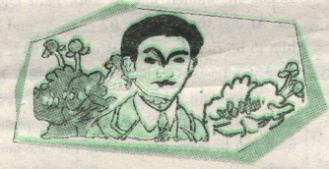
1. This is the people’s musician, Nie Er. 这是人民音乐家,聂耳。
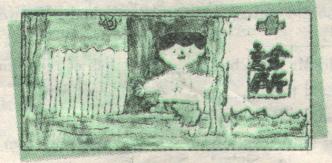
2. On February 15, 1912, Nie Er was born in a family of a doctor in Kunming.
1929年2月15日,聂耳出生于昆明一个医生家庭。
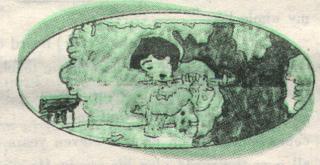
3. When he was in primary school, he learned to play the erhu, the flute and the yueqin.
上小学时,他学会了拉二胡,吹萧和弹月琴。
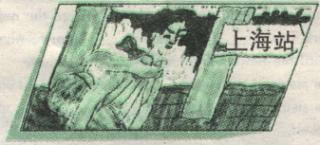
4. Later he went on learning music in Shanghai, Beijing and other places, and he took part in the revolution. 后来,他到上海、北京等地继续学习音乐,并参加了革命。
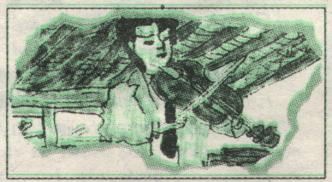
5. He wrote many songs, one of them was March of the Volunteers. After the People’s Republic of China was founded, the song was decided as the National Anthem of the People’s Republic of China. 他写了很多歌曲,其中一曲是《义勇军进行曲》,新中国成立后,这首歌被定为《中华人民共和国国歌》。
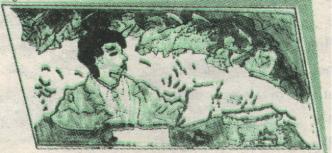
6. Nie Er lives a short life, but his songs will inspire the people forever. 聂耳短暂的一生留下的歌曲将永远激励首人们。